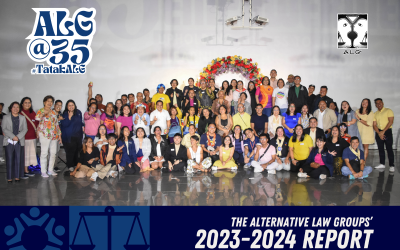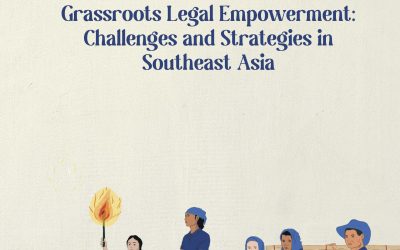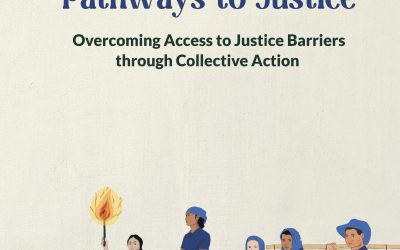Empowering Communities Since 1989
The Alternative Law Groups, Inc. (ALG) is a coalition of 20 legal resource non-governmental organizations that adhere to the principles and values of alternative or developmental law.
UPDATES ON OUR WORK
Stories
The Human Trafficking Crisis in the Philippines and the Survivors Fighting Back
In 2015, Sally Liza Claro, 42 then, applied for a job abroad to provide for her family. But when she arrived in Lebanon, she was trapped into domestic servitude without...

Ang Laban ng Manggagawa ay Laban ng mga Kababaihan
Mahirap maging babae sa mundo ng paggawa. Sa loob ng pabrika at maging sa kanilang mga unyon, bitbit ni Aileen Panuelos at Ana Capillas ang dagdag na pasanin: mga matang mapanghusga, pangmamaliit dahil sa kanilang kasarian, at boses na kailangang ulit-ulitin bago...

Unyon ng Manggagawa: Mula Pag-aalinlangan Hanggang Paninindigan
Parehong namulat si Aileen Panuelos at Ana Capillas sa kanilang mga karapatan nang sila ay sumali ng unyon. Dito nila unang natagpuan ang pag-asa – na sa bawat hinaing, may boses; at sa bawat laban, may kasama. Katuwang ang kanilang mga kapwa manggagawa, nagsimula...

Habang Humahabi ang Makina, May Nagigising na Diwa
Sa gitna ng ingay ng mga makina at abalang mga manggagawa, habang nag-uunahan ang oras at pawis sa trabaho, doon nagsimula ang kwento nina Aileen Panuelos at Ana Capillas, mga karaniwang babaeng manggagawa sa pabrika na nakararanas ng mga kawalang-hustisya sa paggawa....
OUR STAND ON ISSUES
Statements
Pahayag ng Alternative Law Groups ukol sa Pag-Aresto kay Dating Pangulong Duterte
Hustisya para sa mga biktima ng madugong War on Drugs! Hustisya para sa mga biktima ng rehimeng Duterte! Ngayong araw ay inaresto ang dating Pangulong Rodrigo Duterte ng International Criminal Police Organization o INTERPOL para sa mga crimes against humanity kaugnay...
Statement of the Alternative Law Groups on the Anniversary of the People Power Revolution
Never Forget. The People Power Revolution is a testament to every person’s right to be heard and participate in shaping their future – both fundamental pillars of a democratic society. It was a proud moment when ordinary people came together to resist oppression,...
Statement of the Alternative Law Groups on the Last Day of the 18-Day Campaign to End VAW
The world remains an alarmingly dangerous place for women and girls, where violence continues to threaten their safety, well-being, and fundamental rights. Every 10 minutes, a woman is killed according to the United Nations (UN) Women. In the Philippines, 11,585 cases...
Statement of the Alternative Law Groups on the 2024 Martial Law Anniversary
The Alternative Law Groups stand with the Filipino people, especially the victims of the atrocities during Martial Law, in the relentless pursuit of justice and accountability for the human rights violations committed during the Marcos regime and under former...
Statement of the Alternative Law Groups on the World Day Against Trafficking in Persons
The Alternative Law Groups strongly oppose any form of trafficking in persons – a gross violation of human rights – particularly those committed against vulnerable groups such as women and children. This year’s United Nations (UN) global campaign is "Leave No Child...
Statement of the Alternative Law Groups on Pride Month
LGBTQIA+ people share the same aspirations – to survive, thrive, love, and live despite the exclusion, injustice, and cruelty of this world. Discrimination, abuse, harmful stereotypes, and harassment are part of the daily lives of persons with diverse sexual...
IN-DEPTH TAKE
Publications
2023-2024 Report
Marking 35 years of advancing access to justice, ALG’s 2023–2024 Annual Report highlights a time of solidarity, legal...
Grassroots Legal Empowerment: Challenges and Strategies in Southeast Asia
This publication is part of the Alternative Law Groups' Stories from the field: Overcoming access to justice barriers...
Pathways to Justice: Overcoming Access to Justice Barriers Through Grassroots Action
This publication is part of the Alternative Law Groups' Stories from the field: Overcoming access to justice barriers...
Featured Program

Stories from the Field: Overcoming Access to Justice Barriers through Grassroots Communities’ Participation and Collective Action
It consists of multi-thematic research studies to generate knowledge and evidence on key legal empowerment approaches and their contribution to empowering and strengthening grassroots communities’ participation and collective action to bridge access to justice gaps














